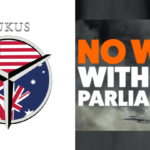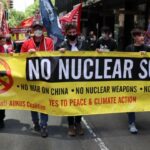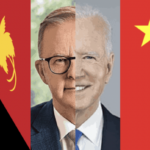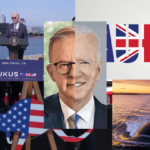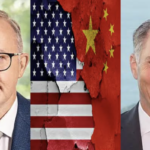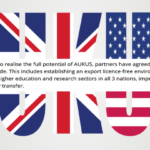The Marrickville Declaration Asserts Civil Society Resistance to AUKUS

Former PM Scott Morrison is the architect of AUKUS: a pact between Australia, the UK and the US involving exorbitant costs, increasing militarisation of the public sphere, the introduction of nuclear military technology and an ever-growing US military presence on this continent.
The last PM is known to have been a self-serving leader, who, it’s now become evident, developed close ties with the Trump administration and the CIA, and, as PM Anthony Albanese rides AUKUS ever deeper, it’s increasingly apparent that his predecessor has opened the floodgates to the US.
Morrison dropped AUKUS on the public like a lead submarine. In fact, he unveiled plans to acquire eight nuclear-powered attack subs, aimed at China. And with a $368 billion price tag, he’s sold us out to years of austerity and committed us to much more than that as the new PM has been learning.
Unsurprisingly, civil society doesn’t want AUKUS. And the Albanese government’s atrocious placating of Israel, as it carries out a colonial extermination of Palestinians, is only fuelling resistance to the new pact, and civil actors have vowed they’ll be doing all in their power to bring AUKUS to an end.
The Marrickville Declaration involves 30 civil society organisations committing to work together to keep the nation out of war and preparation for it, and this type of resistance has been ever-growing since Albanese dropped the crippling AUKUS price tag and burden on us last March from San Diego.
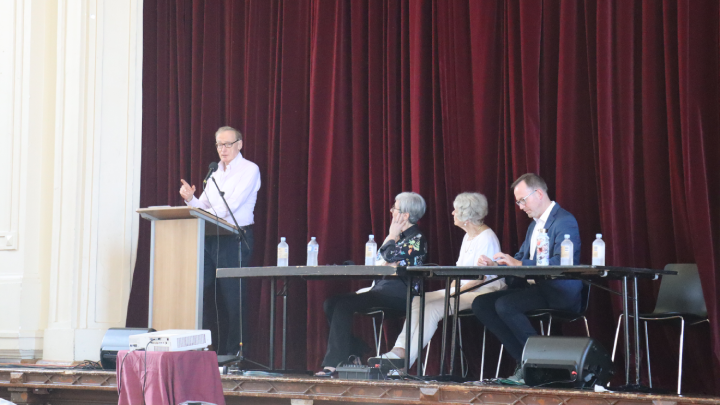
Mobilising against AUKUS
“The huge public spend on nuclear submarines, and the open-ended commitment to foreign military priorities, are to the detriment of addressing urgent community and social needs and priorities for a resilient, safe and peaceful Australian society,” the Marrickville Declaration opens.
And an accompanying press release notes that those “urgent social needs” include “not least the fight against the impact of climate change”. And it would seem that burying radioactive waste, which has a half-life of 24,000 years, within unceded First Nations land is not in keeping with climate goals.
Greens Senator David Shoebridge told Sydney Criminal Lawyers at budget time last May that it was remarkable “seeing Labor deliver opposition leader Peter Dutton’s funding proposal for the nuclear submarine project”, as it cut $74 billion to the NDIS, disability supports, over the next decade.
“Participants at this meeting will work together to keep Australia out of war and stop preparation for war, through campaigning for an end to AUKUS,” the document adds, which obliges those organisations to proactively take part, similar to the requirement for nations in the Genocide Convention.
The organisations include the NSW Teachers Federation, Independent and Peaceful Network Australia (IPAN), Australians for War Powers Reform (AWPR), the Greens Peace and anti-AUKUS Campaign, Marrickville Peace Group and Women’s International League for Peace and Freedom.
Grave consequences
The document lists issues of “grave significance” regarding AUKUS, which include it moves us towards war, creates enemies, opens up an Indo Pacific arms race, makes the nation a nuclear target and it basically hardwires us into the US military-industrial complex.
That “much of its detail that should be in the public domain remains secret and unavailable to the public” is another concern.
Indeed, it’s unclear whether the smorgasbord of AUKUS-related developments last year were established in Morrison’s time and whether there’s more to come.
These developments included the US having designated Australia as a domestic military source in law, our nation is to supply the US with guided weapons, and an AUKUS US-UK joint submarine presence in WA, slated for rollout by 2027, will involve 700 US personnel based here permanently.
Submarine Rotational Force-West will see four permanent nuclear-propelled submarines at HMAS Stirling navy base in WA, and the US attack submarines involved could be carrying nuclear warheads for all the Australian government knows, as it abides by Washington’s policy of warhead ambiguity.
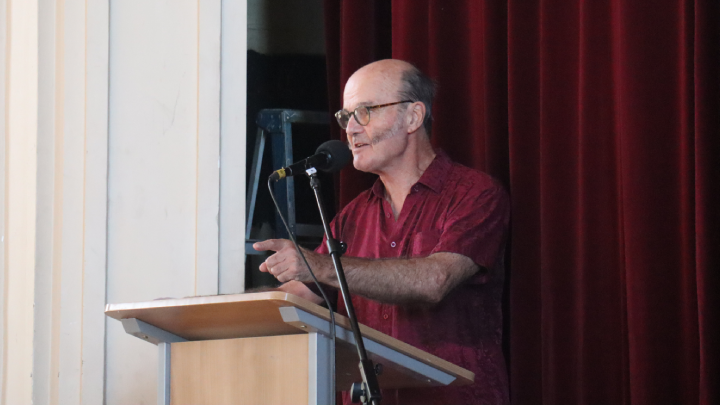
The soft takeover
Concerns about US encroachments onto this continent have been around since the 1960s, with the establishment of the US facilities at Pine Gap and North West Point, and no prime minister has had the guts to directly question these developments since Gough Whitlam was toppled for doing so.
Rather, subsequent Labor and Liberal leaders have rolled out the red carpet for the US. The terms of the 2014 Force Posture Agreement were greenlighted by then PM Julia Gillard in 2011, as the Obama administration pivoted to Asia, and then PM Tony Abbott made this official three years later.
The agreement involves three force posture initiatives, similar to the coming US submarine force, which involve the stationing of 2,500 US marines in the NT, increasing interoperability between both nations’ air forces, and unimpeded access to dozens of local “agreed facilities and areas” for the US.
The list of which local facilities and areas is classified. Yet, when the US upgrades a local base, it effectively takes control of it. This happened at RAAF Base Tindall, with storage for six US B-52 bombers aimed at China on the plans.
And as to whether the planes will be carrying nuclear warheads, who knows?
Prior to the unleashing of the genocidal operation in Gaza, there was heated attention given to the build up to war against China, with US inroads recently being made into Papua New Guinea as well. And this is all what ex-PM Paul Keating has called the US “containment policy” in regard to China.
Former foreign minister Bob Carr wrote last July that if US president Joe Biden didn’t drop the charges against WikiLeaks founder Julian Assange following Albanese’s request of this, “it would look like we have sunk into the role of US territory, as much a dependency as Guam or Puerto Rico”.
And we all know that Julian is currently in London’s Belmarsh prison so sick that he couldn’t attend what could be his final UK appeal hearing prior to US extradition.
Organised civil resistance
Carr and Shoebridge both spoke at a pivotal meeting on a sweltering day last March at Marrickville Town Hall, just across the road from the PM’s electoral office, which saw the sizable hall packed with concerned citizens just days after Albanese and Biden made the San Diego announcement.
Marrickville Peace Group convenor Nick Deane booked the hall to hold the meeting on Morrison’s initial 2021 unveiling, so it would coincide with the second AUKUS announcement.
Carr explained he’d been aware of the “deliberate China panic” being fuelled in the media since 2017.
The Marrickville Declaration further states that participants have agreed to “oppose AUKUS through all nonviolent means available”, to initiate a concerted campaign, as well as “open this campaign to all individuals and organisations” sharing this objective, and to promote peace.
Further organisations involved include Sydney Uni Department of Peace and Conflict Studies, West Papua Association, Sydney Peace Foundation, Wage Peace, the Knitting Nannas, Labor Against War, PEN, Medical Association for the Prevention of War and Australian Community Futures Planning.
Dated the 3rd of February 2024, the Marrickville Declaration further sets out that the organisations want the full details of AUKUS released to the public, as well as the development of a “truly independent foreign and military policy”.
Defence minister Richard Marles and his US and UK counterparts revealed AUKUS Pillar 2 in December, with the first pillar involving the eight submarines.
The second phase will see increasing interoperability between US, UK and Australian forces, which will involve streamlining the sharing of military technologies. And as for the next pillar, it remains an unknown factor.
“The unthinking continuation of Scott Morrison’s AUKUS policy by the Albanese government has been a deep disappointment,” said AWPR’s Dr Alison Broinowski on declaration release this week. “But more than that, it is a dangerous policy that threatens Australian lives and our environment.”
“AUKUS funds from Australia are already underwriting the US nuclear weapons industry,” the former Australian diplomat, who also spoke at the Marrickville meeting last March, continued.
“The US has become an unstable ally. With Donald Trump a real chance of returning to the White House, we cannot risk Australian lives with AUKUS.”


